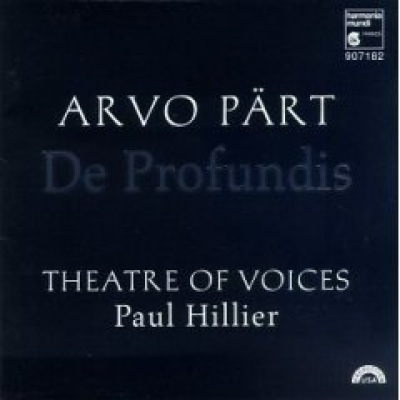
De Profundis
by Glenn Swan A quote from the composer opens the liner notes: "The human voice is the most perfect instrument of all." Arvo Pärt clearly knows how to write for it, and the performers assembled for these recordings handle the material with like-minded respect. De Profundis is a deeply reverent collection of works written and/or arranged for choir in a style the composer is credited for inventing, the tintinnabuli. The primary structure of it comes from tonal triads holding their positions and modulating, in a way not unlike medieval music. Consequently, this work has historical significance as far back as the fourth century. Never mind the fact that, simply put, it's gorgeous. "De Profundis (Psalm 129)" builds with a rumbling of male voices that ascends piously with added support from Christopher Bowers-Broadbent on the organ and Dan Kennedy on percussion, adding weight that's felt as much as heard. "Missa Sillabica" breathes in a way that belies its rather logistical structure, with pitch determined by word length and pauses determined by punctuation. "Solfeggio" has a weightlessness to it, structurally more open-ended and forward-thinking than any other track here, and yet it's the earliest composition featured on the disc (1964). It's a simplified György Ligeti tone cluster that exists rather than evolves, and beautifully so. An a cappella arrangement of "Summa" is also included, and the vocal approach actually brightens and intensifies the composition. "Seven Magnificat Antiphones" shimmers with short passages of sweetness and contemplative stillness, alluding to the seven evenings prior to Christmas Eve. "The Beautitudes," Pärt's first foray into the English language, is the text from Matthew 5:3-12 ("Blessed are the poor in spirit..."). This piece relishes in the space between phrases, making it closer to a tone poem with bookends in F minor. Paul Hillier, the artistic director of the featured Theatre of Voices, gives exhaustive and detailed analysis of these compositions (having written a book on Pärt), and his presence here is the ultimate seal of approval. Estonia's greatest living composer is praying through his music, and it's intoxicating enough to convert all listeners.
